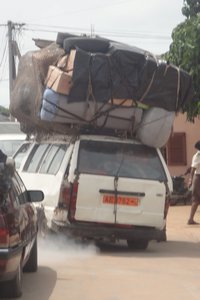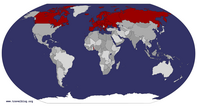Advertisement
Published: June 25th 2010

 DSC00632
DSC00632
Common sight near the border of Benin and TogoI had a great weekend in Grand Popo, Benin. This is beachside village about 1 1/2 hours east of Lome, which is known for its voodoo beliefs and slave history. Apart from these negative aspects, its an interesting place and we had a relaxing 2 days there. 10 of us piled into a combi van complete with deck chairs in the front and back and someone on the floor, for 1 night away at a small hotel on the beach, which looked more like a plantation site. Lush grass, coconut trees, cacti, and no other tourists, it was bliss. Almost 100 fellow Mercyshippers were away for the weekend too, many in Benin, but fortunately we were the only ones where we were staying.... sometimes you just need some time away.
While we were in Benin, we visited Ouidah which is pretty much the centre of voodoo in the world and also used to be a major slave trade village. Fortunately they stopped the majority of slave trading in the late 1800s, but of course slavery is still happening today in huge numbers, just in a more hidden way. We visited a museum, which used to be a slave compound as
well as driving to the beach where the boat with the slaves used to leave for places such as Brazil and Europe.
On a different note, life on the ship is so different to real life. Its a strange thing waking up in a 6 person cabin, and walking up 2 flights of stairs to get breakfast in buffet style (cereal and bread, not cooked unfortunately) (which is only available at pretty restricted times), and then walking back down, and 20 metres from the cabin are 3 wards with 20 african patients (babies, kids or adults) plus their parent or sibling or other child in each ward. What's stranger is walking through the large port with kissing and hissing sounds from the men sleeping or sitting near their trucks, waves from some people, but generally people are either yelling out yovo yovo or just staring at the walking zoo. A bit of information: yovo means white saint. Apparently the africans thought the white people were angels when they first saw them all those years ago. I guess/hope that is a good thing, I think the meaning may have been lost now.
Nursing is so different here too. Unfortunately

 DSC00679
DSC00679
Gorgeous African family. This is a common site-3 or 4 family members on a motorbikeall the cases here would not have been left that long in NZ before surgery would have been available. Often tumours grow so large that they occlude airway (and probably many africans have died from this), or make life so unbearable physically and emotionally. Because of the lack of hospitals, doctors and clinics in africa, people rely on the local witch doctor to heal them with herbal medicines as well as surgery attempts. Occasionally we see scars from where local doctors (or anyone by the sounds of it) have attempted to poke and prod and stab tumours and have injected who knows what into it.
One 18 year old girl I am looking after at the moment has a nasty infection on her foot. She had the 2nd toe removed and a reconstruction of the big toe as it was a lot bigger and crooked since birth and therefore quite difficult to walk and in turn wear shoes. Unfortunately, infection is eating away the area in between the big toe and where the 2nd toe was. I doubt that this would be happening (or be allowed to happen) in NZ (or any developed country). There are so many more

 DSC00681
DSC00681
Village on the way to Grand Popo surrounded by waterresources which would have and should have helped prevent this: more stronger IV antibiotics, maybe surgery to debride the dead tissue and do skin grafts, better dressings and wound products and maybe better decisions. Of course, we have to make do with what we have and what is donated, but its hard to watch a girl who loves to watch and play football, to have her foot deteriorate and almost rot away in front of you. Will she play football again, will her foot look much worse than before she came to us, will she be really discouraged and have ill feelings towards us?
Another patient who has really touched my heart is a 10 year old boy who had a large neurofibroma tumour on the side of his face. It had been growing for about 4 years I think, and had caused one of his eyes to remain closed due to the increased size of the tumour. He was such a shy, expressionless and withdrawn boy who came in with his 17 year old brother. Sometimes siblings accompany the child as there are may be many other siblings, so the mother can by no means come in for
several weeks. His one open eye pretty much shouted - history of isolation, verbal abuse at the least, lack of trust in others and white people, lack of love and attention and lack of social interaction.
Two days after surgery and with much swelling still present, I sat him on my lap and showed him his face with a mirror. For a moment, I got a slight glimpse of what it must be like to see that reflection. Of course it wasn't the most beautiful transformation, it was still really swollen and there were staples in the 2 major wounds, each about 10cm long. The boy remained expressionless and after staring at his face moving the mirror around at different angles for about 2 minutes he went back to his bed, Im not sure what he was thinking but Im sure he was disappointed. He was probably expecting it to look perfect and normal, but its hard to gauge what he was thinking. I think thats how God's heart breaks when he sees these patients too. They shouldn't have to deal with disfiguring defects and all the abuse from others.
He was sick for 3 days with vomiting
but he recovered well and turned a corner at about day 5 post op. He started to smile a little, and let me hold his hand when we went skipping up the corridor and day by day he warmed a bit more, until when he left he gave me a little wave. What was really nice was seeing him come back to the ship for dressing changes a few times a week and seeing him smiling and his face healing beautifullly.
At the moment we have 2 VVF surgeons for women who are leaking urine from injuries during childbirth. This is a huge unfortunately common problem in Africa, occuring in approximately 125,000 women each year, with an estimated 11,000 repair surgeries being performed in Africa and Asia. Thats a huge disparity between how many can receive a repair and how many live with it for many years. The solutions are surgery and surgery. This is a strange concept, but prevention is surgery (C-sections as soon as there is difficulty and the baby won't come out) and treatment is surgery to repair the fistulas. There are not enough doctors. In New Zealand there is about 1 doctor for every 420
people, whereas in Togo there is only 1 doctor to every 25,000 people!
One ward was filled with 23 patients last night (there are only 20 beds normally), sleeping on beds and mattresses on the floor. Most of these women are pre-op and therefore the smell of urine is overwhelming. Fortunately I was working in a different ward, but even my 20 second visit was enough to make an impression. What is worse is that we have run out of pads to put under them on the bed, and adult sized nappies, so you can only imagine how wet their clothes, sheets and floor near them is. How awful, a simple thing like pads to show mercy and love, yet we cannot do that. Maybe thats a western way of thinking, most probably that is not on their top list of needs. Maybe they are wanting/hoping for acts of acceptance and love, and their fears to be allayed as they sit in a room with white walls in a big metal ship, in a ward with air conditioning and no windows which they might think is under the sea, with white people who can't speak their language.
I'm
sure they are used to the smell and being 'wet' all the time, although these ladies are most often isolated so it must be a strange feeling for them to all be together in one room with the same problem. Maybe its an encouraging and supportive time and feeling of community, not sure. Its really cool to see them marching up and down the corridors with the nurses and translators singing songs and cheering each other along. That must be quite an effort for them, many of them seem so withdrawn and reserved from things such as years of rejection, emotional and physical abuse, lack of love and friendship and acceptance, lack of self-worth as a woman and wife, lack of hope, grieving over lost babies and their husband/partner leaving them, being outcasts, smelly, wet, disgusted looks, lack of ability to make money and therefore survive, lack of medical professionals who care or can help, lack of strength in their legs from damaged nerves, and dependance on whoever can show them mercy. A list I can't even imagine. I don't think I have really even experienced one of these!
Anyway, even though all of this seems impossible and overwhelming,
we (everyone on the ship) is trying and making a difference one person at a time. Thats all we can do
Advertisement
Tot: 0.254s; Tpl: 0.015s; cc: 6; qc: 45; dbt: 0.0406s; 1; m:domysql w:travelblog (10.17.0.13); sld: 1;
; mem: 1.2mb





















